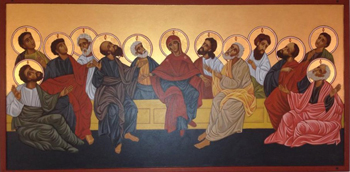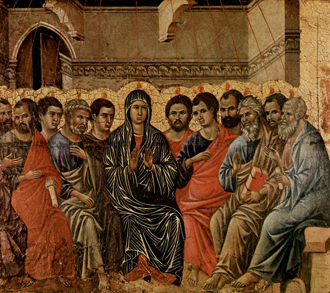For Sunday May 15, 2016
Lectionary Readings (Revised Common Lectionary, Year C)
Psalm 104:24-35
Romans 8: 12-25
John 14:8-27
My native language is Malayalam, one of India's twenty-two official languages. Though my parents immigrated to the United States when I was an infant, they insisted we speak Malayalam at home, so I grew up bilingual.
I also grew up with a divided and defensive sense of identity. We (brown people) were Indian and spoke Malayalam, while they (white people) were American and spoke only English. As immigrants determined to make America our home, we might cross the great divide and master English, too, but the linguistic traffic would never flow in the opposite direction. After all, I had never even met an American who'd heard of my language — this despite the fact that 38 million people on the planet speak it. "What's it called again?" my friends would ask when I sounded out the four-syllable palindrome. Or — worse — "I don't get it. I thought Indians speak Hindu."
I must have been nine or ten years old when my aunt and uncle called our extended family together one weekend for a "special surprise." When all thirty of us were packed into his living room, my uncle introduced a guest — a blond-haired, blue-eyed woman in her thirties, named Sarah. He explained only that Sarah had spent a few childhood years in Delhi, where her parents worked as journalists, and that her family had vacationed occasionally in Kerala — the South Indian state my family is from. He then handed things over to her.
| |
It's hard to do justice to what happened next. Suffice it to say that thirty jaws crashed to the carpet when Sarah nodded to my uncle, smiled warmly at us, and said, "Namaskaram, ningalay ellavarayum kandathil ennicku santhosham ondu." ("Hello, I'm so happy to meet all of you.") Over the next twenty minutes — while my relatives gawked and gaped — Sarah told us her story in careful but convincing Malayalam. Those childhood trips to Kerala had fascinated her. So much so that she moved to South India after college, and immersed herself in the language and culture. "It was very hard," she admitted. "Learning the script, forming such new sounds — annoying people with my mistakes. But I'm so glad I did."
Over dinner, she went on to explain how much her Kerala immersion changed her. "I didn't realize before how limited my own perceptions were. My ideas about humor, about art, about God. I didn't know how many things were unsayable in a single language."
I thought about Sarah for a long time after that evening, because her visit altered my world. Something became possible for the first time — an alliance, a bridging, a new kind of empathy and friendship. When my family experienced the unprecedented pleasure of hearing "an American" speak our language, we realized that the many distances separating "us" from "them" were not, in fact, un-crossable. Sarah — the stranger — had taken a risk, made herself vulnerable, and entered our world. In doing so, she had rendered us less strange. Less alien. Less Other.
But she had also offered us a challenge: it would no longer be possible, in the light of her generosity, to hang onto our stingy, self-protective narratives about identity. She had bulldozed her way through that barrier, and only a massive act of cowardice and denial on our part would re-erect it.
This week, we celebrate Pentecost, the coming of the Holy Spirit by fire, wind, and word. Pentecost — from the Greek pentekostos, meaning "fiftieth," was a Jewish festival celebrating the spring harvest, and the revelation of the law at Mount Sinai. In the New Testament story Luke tells, the Spirit descended on 120 believers in Jerusalem on the fiftieth day after Jesus' resurrection. The Spirit empowered them to testify to God's great deeds, emboldened the apostle Peter to preach to a bewildered crowd of Jewish skeptics, and drew three thousand converts in one day. For Christians, Pentecost marks the birthday of the Church.
By any stretch of the imagination, it's a fabulous birth story, full of riveting details. Tongues of fire. Rushing winds. Accusations of drunkenness. Mass baptism. It's easy to get lost in the spectacle. But the detail that stops me in my tracks every year is this one: "All of them were filled with the Holy Spirit and began to speak in other languages, as the Spirit gave them ability." "At this sound the crowd gathered and was bewildered, because each one heard them speaking in the native language of each."
 |
As Christians, we place great stock in language. In words. Like our Jewish and Muslim brothers and sisters, we are People of the Book. We love the creation stories of Genesis, in which God births the very cosmos into existence by speaking: "And God said." "In the beginning was the Word," we read in John's dazzling poem about the Incarnate Christ. On Sunday mornings, we profess our faith in the languages of liturgy, creed, prayer, and music. In short, we believe that language has power. Words make worlds. And unmake them, too.
If this is true, then what does the miracle at Pentecost signify? Have we really grasped the import of what the Spirit did — what the Spirit insisted on — at the inaugural moment of the Church? After all, there is nothing easy about substituting one language for another. Languages are intricate and messy. They carry the full weight of their respective cultures, histories, psychologies, and spiritualities. To attempt one language as opposed to another is to make oneself a learner, a servant, a supplicant. To speak across barriers of race, ethnicity, gender, religion, culture, or politics is to challenge stereotype and risk ridicule. It is a brave and disorienting act.
And this is what the Holy Spirit required of Christ's frightened disciples on the birthday of the Church. Essentially: Stop huddling in what you call safety. Throw open your windows and doors. Feel the pressure of My hand against your backs, pour yourselves into the streets you've come to fear, and speak! Don't you understand? Silence is no longer possible; you are on fire.
What I love about the Pentecost story is that it required surrender and humility on both sides. Those who spoke had to brave languages far beyond their comfort zones. They had to risk vulnerability in the face of difference, and do so with no guarantee of welcome. They had to trust that no matter how awkward, inadequate, or silly they felt, the words bubbling up inside of them — new words, strange words, scary words — were nevertheless essential words — words precisely ordained for the time and place they occupied.
Meanwhile, the crowds who listened had to take risks as well. They had to suspend disbelief, drop their cherished defenses, and opt for wonder instead of contempt. They had to widen their circles, and welcome strangers with accents into their midst.
Not all of them managed it — some sneered because they couldn't bear to be bewildered, to have their neat categories of belonging and exclusion explode in their faces. Instead, like their ancestors at Babel, who scattered at the first sign of difference, they retreated into the well-worn narrative of denial: "Nothing new is happening here. This isn't God. These are blubbering idiots who've had too much to drink."
But even in that atmosphere of suspicion and cynicism, some people spoke, and some people listened, and into those astonishing exchanges, God breathed fresh life.
Something happens when we speak each other's languages. We experience the limits of our own words and perspectives. We learn curiosity. We discover that God's "great deeds" are far too nuanced for a single tongue, a single fluency.
 |
I think the Pentecost story compels us because it's a story for our time. We live in a world where words have become toxic, where the languages of our cherished "isms" threaten to divide and destroy us. The troubles of our day are global, civilizational, catastrophic. If we don't learn the art of speaking across the borders that separate us, we will burn ourselves down to ash.
For those of us living in America this election year, the temptation to retreat into our political enclaves is especially strong. Why bother to understand — much less to speak — the languages of those whom we disagree with? Why not sneer? Isn't sneering easier? Isn't it more fun?
Maybe. But it is no small thing that the Holy Spirit loosened tongues to break down barriers on the birthday of the Church. In the face of difference, God compelled his people to engage. From Day One, the call was to press in, linger, listen, and speak.
Because here's the thing: no matter how passionately I disagree with your opinions and beliefs, I cannot disagree with your experience. Once I have learned to hear and speak your story in the words that matter most to you, then I have stakes I never had before. I can no longer flourish at your expense. I can no longer make you my Other. I can no longer abandon you.
At my church, we respond to Sunday morning Scripture readings with these words: "Hear what the Spirit is saying to God's people." Can we hear it? Can we dare to hear what the Spirit is saying? Stop huddling. Stop sneering. Speak. Silence is no longer possible. You are on fire.
Image credits: (1) Wikipedia.org; (2) The Life of the World; and (3) Wikipedia.org.





